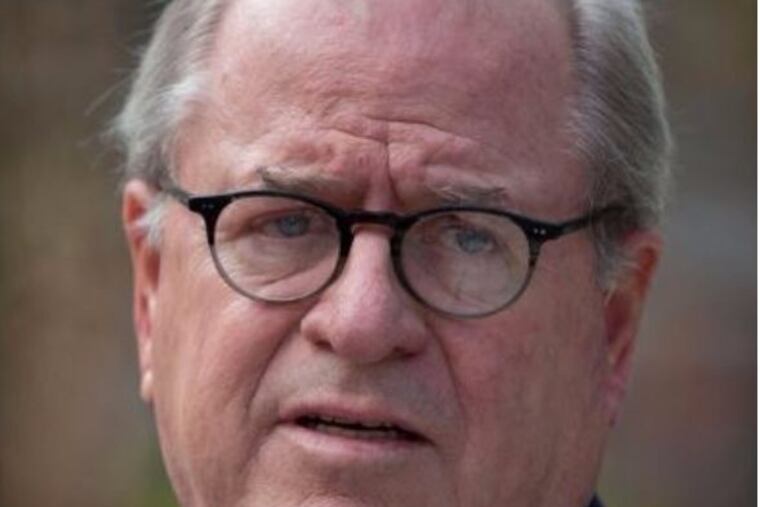Ex-state chief justice backs embattled former state prosecutor
In the last of three days of hearings, former state prosecutor Frank Fina defended himself against an ethics charge growing out of the Penn State/Jerry Sandusky scandal. Former state Chief Justice Ronald Castille said Fina, a leader in the investigation of the scandal, had not violated the official code of conduct for lawyers. A ruling is not expected for several months.

Ronald D. Castille, former chief justice of the state Supreme Court, on Wednesday called the disciplinary case against former top state prosecutor Frank Fina "a travesty of justice" and said he would have reversed an appeals court ruling that was highly critical of Fina.
Testifying as expert witness on behalf of Fina, Castille said the former prosecutor had acted properly in obtaining damaging testimony from the former Pennsylvania State University general counsel to build criminal cases against the university's ex-president and two other former university administrators.
The three men now all stand convicted of endangering the welfare of children for their failure to alert authorities to an allegation that former university assistant football coach Jerry Sandusky had been accused of sexual assault of minors. But before their convictions, a state Superior Court panel tossed out many of the most serious charges against the men after they questioned Fina's tactics as a leader of the investigation into their cover-up.
Former Penn State president Graham Spanier and the others successfully argued before the appeals court that Fina erred in eliciting testimony from onetime counsel Cynthia Baldwin, saying this had violated their rights because she had previously represented them before the investigative grand jury looking into the scandal. Castille, appearing in Philadelphia in a hearing before the state legal Disciplinary Board, said Superior Court got it wrong.
The former chief justice said Spanier and former administrators Tim Curley and Gary Schultz had stonewalled Baldwin when she asked them about Sandusky as she gathered information to respond to subpoenas to the university. Their lies stripped them of their right to invoke the attorney-client privilege to keep Baldwin silent, Castille told the board.
"You can't lie to your lawyer and expect that lawyer to be your counsel," Castille testified. "It's as simple as that."
For years, Fina was one of Pennsylvania's most well-known prosecutors. During 15 years with the state Attorney General's Office, he led a series of sweeping probes of corruption in the state legislature. He also launched an undercover sting that caught Philadelphia politicians pocketing cash.
He was also in the headlines for a clash with former state Attorney General Kathleen Kane, a critic of the Sandusky investigation. She also blamed Fina for Inquirer articles disclosing that she had secretly shut down the sting cases. She was convicted in 2016 of violating grand jury rules in attempting to plant a news story critical of Fina.
Wednesday's hearing was the last of three days of testimony devoted to the Fina ethics case. The three lawyers who heard the case will now issue findings to the full legal Disciplinary Board. The lawyers' recommendation is more than two months away. Fina, who is now in private practice, faces a possible suspension of his law license.
The ethics case against Fina turns on intricate questions of law and the attorney-client privilege. Baldwin has insisted that she was representing the university as an institution during the Sandusky scandal, and not Spanier and the others individually. She also has said she made that clear to the three men, giving them what she called a "corporate Miranda" warning.
At the same time, however, she said the law permitted her to serve as the men's lawyer during their grand jury testimony. She said she believed at that time that the university and the men were united in a common legal posture — sharing the view there had been no cover-up of Sandusky's behavior. Later, she said, she concluded she had been lied to, especially after investigators turned up a hidden cache of emails and notes documenting the men had agreed to keep silent about Sandusky.
When called as a witness by prosecutors, she and Fina said, she testified only after the university, her client, gave her permission to do so. Moreover, Fina has said, he limited his questions to her dealings with the three administrators over the investigative subpoenas and didn't ask about their grand jury appearances.
Earlier Wednesday, the last day of testimony in the Fina matter, Amelia C. Kittredge, the Office of Disciplinary Counsel lawyer pursuing the civil case against the former prosecutor, pressed Fina about that grand jury testimony.
"You expected them to commit perjury, didn't you?" Kittredge asked
"No. Absolutely not, " Fina replied.
"They weren't informational witnesses. They were suspects," Kittredge said.
"They were fact witnesses," Fina replied.
In closing arguments, Kittredge said Fina had violated the state ethical code for lawyers, which she said only rarely permits lawyers to be called as witnesses against their clients.
In his closing, Joseph McGettigan, a lawyer for Fina, said that the former prosecutor had been subjected to a dishonorable and shameful legal attack. He said Fina was facing revenge from "five convicted criminals" — Sandusky, Spanier, Curley, Schultz, and Kane.
"All they have done," McGettigan added, referring to lawyers bringing the ethics case, "is defame and denigrate an honorable man, a good public servant."